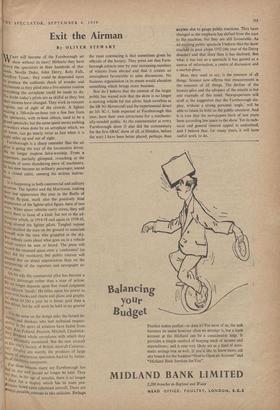Exit the Airman
By OLIVER STEWART
1/47V FIAT will become of the Farnborough air show without its stars? Hitherto they have °Fawn the spectators in their hundreds of tho- sands. Neville Duke, John Derry. Roly Falk, (Jeoffrey Tyson : they could be depended upon to produce the authentic shock of wonder and excitement as they piled into a five-minute routine everything the aeroplane could be made to do. 1\4° doubt today's pilots are as skilful as they; but their mounts have changed. They work in remoter regions, out of sight of the crowds. A fighter °taking a 700-mile-an-hour run a few feet from the spectators, with re-heat ablaze, used to be a grand spectacle; but the same speed seems nothing nowadays when done by an aeroplane which, we all know, can go nearly twice as fast when it is eight miles up and out of sight. . Farnborough is a sharp reminder that the air Pilot is going the way of the locomotive driver. Ile no longer inspires hero-worship. From a LIPerillan, partially glimpsed, crouching at the tiritrols of some thundering piece of machinery, le has now become an ordinary passenger, seated in a closed cabin, conning his written instruc- tions, It is happening in both commercial and military aviation, The Spitfire and the Hurricane, making their last appearance this year in the Battle of ii rittlin fly-past, mark also the positively final 4I3Pearance of the fighter-pilot figure, hero of two „.`trs. When space vehicles carry crews, they will carry them to fame of a kind; but not to the ad- hlihration which, in 1914-18 and again in 1939-45, t tin. 8 around the fighter pilots. Tangled vapour htlalls enabled the man on the ground to associate but with the men who grappled in the sky. . III nobody cares about what goes on in a vehicle :Inch cannot be seen or heard. The press will they the returned space crew a 'conference' (as depend did the monkeys), but public interest will o"!-Pend less on direct appreciation than on the "IPourings of the reporters and newspaper re- U'rite men. i;,°11 his side the commercial pilot has become a literary ,, r,Y Personage rather than a man of action. ale n° longer depends upon fine visual judgment pou del .. leate 'hands.' He relies upon his power to Atte over books and charts and plans and graphs. busati3out £4,500 a year he is better paid than a driver, but he will soon be held in no greater awe, sig lit, is the same on the design side; the famed de- or abii..ers and thinkers who lent technical respect- s. .13' to the sport of aviation have faded from alight, a e,, 's0e, Folland, Pearson, Mitchell, Chadwick: yv -i,' designed whole aeroplanes with which they
taiLitelisPyeZnsasllocy Society of But the new aircraft of British Aircraft Construe-
t:rs,, DisPlaY are mainly the products of large i .Is of anonymous specialists backed by batter- es of electronic computers. , For these reasons many say Farnborough has 'lad its day and should no longer be held. They as,ty that, in the age of missiles, there is no longer place for a display which has its main pro- gramme based upon inhabited aircraft. There are Itcveral possible answers to this criticism. Perhaps
Sp
I),
15
1,
the most convincing is that sometimes given by officials of the Society. They point out that Farn- borough attracts year by year increasing numbers of visitors from abroad and that it creates an atmosphere favourable to sales discussions. No business organisation in its senses would abandon something which brings more business.
Nor do I believe that the interest of the larger public has waned now that the show is no longer a starring vehicle for test pilots. Such novelties as the SR-NI Hovercraft and the experimental direct jet lift SC-I, both expected at Farnborough this year, have their own attractions for a mechanic- ally-minded public. As the commentator at every Farnborough show (I also did the commentary for the first SBAC show of all, at Hendon, before the war) I have been better placed, perhaps, than anyone else to gauge public reactions. They have changed as the emphasis has shifted from the man to the machine, but they are still favourable. As an exciting public spectacle I believe that the show reached its peak about 1952 (the year of the Derry disaster) and that since then it has declined. But what it has lost as a spectacle it has gained as a source of information, a centre of discussion and a market-place.
Man, they used to say, is the measure of all things. Science now affirms that measurement is the measure of all things. The decline of the human pilot and the advance of the missile is but one example of this trend. Newspapermen will scoff at the suggestion that the Farnborough dis- play, without a strong personal 'angle,' will be able to retain its hold on the public attention. And it is true that the newspapers have of late years been according less space to the show. Yet its tech- nical and general interest appeal is undoubted, and I believe that, for many years, it will have useful work to do.


































 Previous page
Previous page